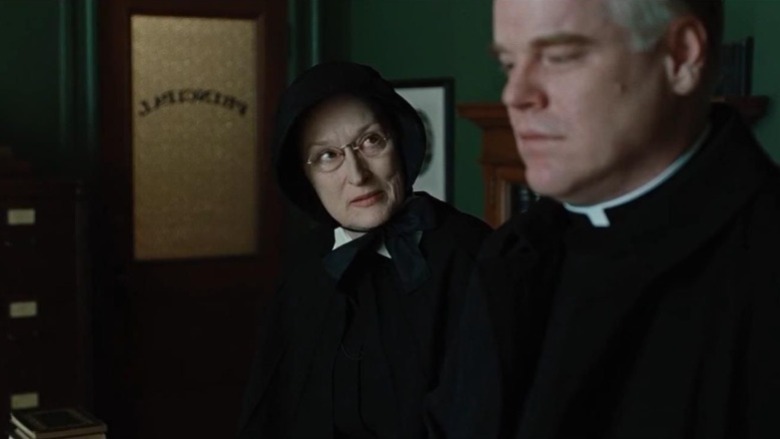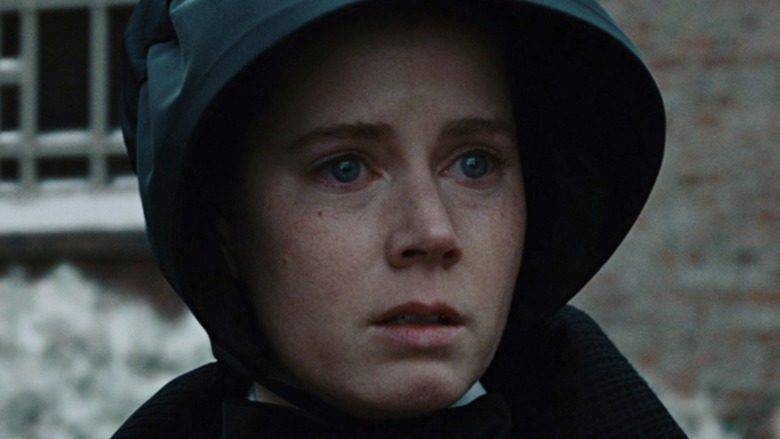NEW YORK (NY)
Looper [New York NY]
April 20, 2021
By Leo Noboru Lima
If we wanted to name the 21st century movie with the best ensemble cast, we could make a strong argument for 2008’s Doubt. In addition to Meryl Streep and the late Philip Seymour Hoffman, both playing characters that rank among the richest and most complex of their careers, there was Amy Adams. She was still early in her path to stardom, but this role served as a perfect bridge between the sunny ingénues she specialized in at the time of Enchanted and the severity that would define her later roles. Topping it all off, Viola Davis, then a theater actress unknown to mainstream audiences, appeared for eight minutes in one of the all-time greatest performances with barely any screentime. All four actors earned Oscar nominations.
There was a reason Doubt, specifically, was the film to bring together such a firestorm of acting talent. An adaptation of John Patrick Shanley’s Tony-winning play about a 1960s nun who suspects a priest of abusing one of her parish school’s students, Doubt is full of thorny dramatic situations that only stage adaptations can yield. Every scene is an opportunity for the actors to burrow into challenging character notes, dense political themes, and heady existential metaphors. These particularly apply to the pair of scenes that conclude the movie.
Doubt Is a Power Struggle
The central question of Doubt asks if Father Brendan Flynn (Hoffman) has sexually abused Donald Miller (Joseph Foster), the only Black student at the all-boys St. Nicholas Catholic School in The Bronx. The school principal, Sister Aloysius (Streep), is utterly convinced this has happened, despite the lack of hard evidence. After talking to Donald’s mother (Davis) and learning Donald may be gay, she determines she must drive Father Flynn away at any cost and calls him in for a heart-to-heart.
During this conversation, it becomes clear how little Doubt concerns Father Flynn’s alleged crime, and how much it addresses the power dispute between him and Sister Aloysius. At first, he threatens to have her removed. She manages to drive him out of St. Nicholas by blackmailing him. Flynn must transfer to a new parish of his own will, or she’ll go to each of his previous parishes and scrutinize his past until she finds parents willing to denounce him, even if it costs her a career as a nun.

Realizing he is no match for Aloysius’ righteous determination, Father Flynn caves. Nothing is proven, but she beats him at the game set up between them. While he has greater power in the church hierarchy, he has nothing on her once she’s willing to put her office on the line.
Still, we could say Father Flynn wins in the larger scheme of things, as the final scene reveals that he has transferred to an even more important position at a bigger church. This “defeat” helps explain why Aloysius feels so anguished, exclaiming “I have doubts! I have such doubts!” as the movie fades to black. However, there’s much more to her desperation in that closing moment.
Doubt Is a Parable for a Great Philosophical Debate
The last scene of Doubt consists of a conversation between Sister Aloysius and Sister James (Adams), the young, naive teacher who first reported Father Flynn’s activities. Throughout the whole film, Sister James has felt uneasy about monitoring Flynn’s supposed misbehavior. She only did this because Aloysius, feeling threatened by Father Flynn’s progressive ideas and modern philosophy, directed all of the school’s teachers to “be alert” towards him.

When Aloysius reveals that she was lying about knowing Flynn had a history of suspicious behavior in previous parishes, it’s a double betrayal: She has led James to unwittingly go along with a lie and used her to hound out a potentially innocent man. As Aloysius tells it, the fact that she’s done a bad thing on a personal level is acceptable. In her own words, she took “steps away from God, but in His service.”
This deference to a higher morality sums up the real conflict of Doubt. There is a constant struggle between established, impersonal structures and the volatile, ever-transforming humans who inhabit them. Aloysius takes no pleasure in being strict and harsh toward her students or rejecting the parish’s natural inclination towards progressivism. She does it because she believes the Church’s duty is to be a higher standard, an entity wholly apart from the rest of the changing world.
It’s almost irrelevant to her if Father Flynn is merely consoling Donald or taking advantage of him. He’s overstepping as a man of God, and it’s the same reason Flynn’s resignation can’t be seen as an admission of guilt. He and Sister Aloysius know the world they live in is deeply conservative, so she could turn the congregation against him, even if he’s not an abuser.
Sister Aloysius’ doubts reach far
It’s possible to side with Father Flynn, viewing him as an innocent man whose actions are willfully misinterpreted as evildoing. At the same time, the history of systemic abuse in the Catholic Church shows that Sister Aloysius has a point — priests have a position of power over their pupils, and rigidly supervising such relationships is a valid way to make sure there’s no room in them for abuse. In that way, Aloysius’ final cry of “I have such doubts!” can be taken as a meta-reflection of the audience’s undecided state of mind.
But why does she suddenly have doubts, after spending the whole film certain of Flynn’s guilt? The answer is that Aloysius is a human being herself and unable to fully uphold the Church’s discipline. Early on, she’s seen hiding the elderly Sister Veronica (Alice Drummond)’s blindness from the rest of the parish so that Veronica won’t be thrown out of the convent. Despite her professed moral clarity, Aloysius understands the appeal of modernity, with all its flexibility and room for emotion. She knows Father Flynn might be right, and that the Church might need to change.
For most of the story, she’s able to ignore that doubt. However, the senior clergymen, the traditional Church structure Aloysius is so bound to, rewards Flynn. It’s a moral ultimatum: Either Aloysius respects the senior clergy’s actions, in which case she has to admit that her view of Flynn is incorrect, or she holds fast to her belief in Flynn’s guilt and confronts the fact that the Church’s entire operation might be warped and corrupted, possibly for a long time.
Either way, she loses something. Her personal faith is no longer reconcilable with her practice as a nun. And that’s where Doubt ends, because the conflict has become too big for any one movie to resolve.
